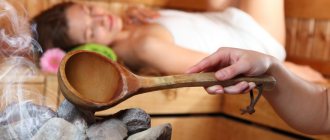Is it possible to take a bath at night? Why do many people say that it is better not to do this?
There are quite a lot of superstitions among people and they will assume why a steam room at night is a bad decision. But we know very well that visiting the steam room is very useful. But according to ancient customs, as well as popular beliefs, they say that it is better to refuse to visit the bathhouse at night, since at this time the evil spirit rules. Whether this is true or not, we will try to understand the article and reveal the main prejudices about the bathhouse.
On what days in Rus' was it forbidden to go to the bathhouse?
It was not possible to take a steam bath in a Russian bathhouse throughout the week; certain days were set aside for this important hygienic event.
The importance of the bathhouse in Rus' is difficult to overestimate - it was a kind of ritual of cleansing the soul and body. In the old days, people believed that a hot bathhouse could fight many bodily ailments. Before all holidays and special events, people visited the steam room. Dear guests, before being seated at the table, were necessarily invited to take a steam bath in the bathhouse.
But at the same time, there were a lot of prohibitions on going to the bathhouse. Such taboos were associated both with ancient pagan beliefs and with Christian customs.
No bath days
People could not use a bathhouse on all days of the week, because there were so-called non-bath days. A significant role here was played by faith in the bannik - a fabulous creature who was the owner of the bathhouse. No one dared joke with such a “brownie.” It was rumored that this owner's disposition was by no means meek. Monday was the day when the bathhouse was at the complete disposal of the bathhouse owner. Those who disobeyed could face a terrible punishment. It was believed that a bathhouse could skin a person alive, and also pour boiling water over the poor fellow if he dared to disturb the “brownie” on a Monday that was not a bathhouse.
Church holidays and Sunday
On church holidays it was strictly forbidden to take a steam bath. It was believed that cleanliness in all areas should precede the holiday. On such days, believers had to pray a lot, go to church and give alms. In addition, it was impossible to work on holidays, but heating a bathhouse without physical effort is not an easy task. The only exceptions were “clean days”, when putting things in order or bathing was considered an integral part of the church holiday: Maundy Thursday, Epiphany, Holy Week.
At night
After 12:00 in Rus', no one went to the bathhouse, because it was believed that evil spirits came to the bathhouse to take a steam bath. Bannik appeared in Slavic mythology in many images: a naked old man, a huge monster, a cat or a frog. There were no protective icons in the bathhouse (and the bathhouse itself was considered an unclean place, despite washing), the pectoral cross also had to be removed at the entrance, so people were very afraid of the cruel spirit of the bathhouse.
Third par
The third steam is nothing more than the third visit to the bathhouse, since sometimes almost half the village was steaming in one bathhouse. During the third steam in the bathhouse, the owner himself took a steam bath, so people tried to wash themselves in two passes.
Tipsy
It was strictly forbidden to take a drunken bath in the bathhouse! Bannik did not like such guests. Although there were practical reasons: drunk people often died or suffered serious burns. In addition, even then people knew about sudden jumps in blood pressure.
The first men
It was believed that by entering the bathhouse behind someone, the illnesses and sins of your predecessors would certainly pass on to you. That's why women came after men... In those days, a man was considered a breadwinner, so he was given special respect.
Why is not every day suitable for visiting the bathhouse?
Priests say that one should not wash on church holidays and Sundays: during such periods it is necessary to devote full time to God.
It is best to read prayers and help those in need. In the old days, people tried to go to the bathhouse only on certain days. This was due to the belief in the bannik. This mythical creature lived in every bathhouse and considered itself the master there. If a person who came to wash interfered, he automatically received a serious punishment: he was scalded with boiling water or even lost part of his skin.
It was not allowed to wash after midnight: at this hour, evil spirits come to visit the bathhouse to take a steam bath together. When there were many people wanting to wash, people made several visits. The third of them was considered dangerous: a bannik could appear now.
What you can and cannot do on Kazanskaya: customs, traditions, signs
The Day of the Kazan Icon of the Blessed Virgin Mary, or the Kazan Mother of God, is celebrated by all Orthodox Christians on July 21 and November 4.
This is one of the most beloved and revered images of the Blessed Virgin Mary in Russia. From the very beginning, long before it was declared a state holiday, it was not only a church holiday for Orthodox Russians, but also a national holiday.
In 1649, by order of Tsar Alexei Mikhailovich, the holiday in honor of the Kazan Icon of the Mother of God became a church-state holiday. Then the sovereign obliged to celebrate not only the day of her appearance, July 21, but also November 4, in memory of the deliverance of Moscow and Russia from the Poles.
The Kazan Icon of the Mother of God has a very interesting history. It was found in 1579 by a nine-year-old girl in the ashes of a terrible fire that destroyed part of Kazan. The fire in Kazan started in the house of the merchant Onuchin. After the fire, the Mother of God appeared to the merchant’s daughter Matrona in a dream and revealed to her that under the ruins of their house there was her miraculous image buried in the ground. At first they did not pay attention to the girl’s words, but when the dream repeated itself three times, they began to dig and found an icon of amazing beauty in the ashes. The holy image, despite the fire, looked as if it had just been painted. The image was solemnly transferred to the parish church of St. Nicholas of Tula, the rector of which was then the pious priest, the future Patriarch of Moscow and All Rus' Hermogenes.
What to do on the feast of Our Lady of Kazan?
Traditionally, on this day, all believers went to churches, where they prayed for their homeland, for their loved ones and relatives, so that there would be peace and tranquility in families. After the liturgy, the Orthodox went on a religious procession - with icons in their hands, they walked around cities and villages, which symbolized the protection of the settlement from harm. Today, as a rule, they limit themselves to walking along the main streets or just around the church.
This day is considered happy for marriages and weddings. In the old days, it was believed that on such a bright day of the triumph of the Orthodox faith, it was the right time to start a new family. Those who wanted to live their family life without problems and in happiness, sought to time the wedding ceremony specifically for the autumn holiday of the Kazan Mother of God.
Kazan Mother of God holiday, what not to do?
The Feast of the Icon of the Mother of God is not one of the twelve feasts of the church year. Therefore, nowhere will you find categorical prohibitions that you cannot work on this day. But among the Russian people, this holiday is revered by everyone, and, according to folk signs and superstitions, urgent matters cannot be performed on this day, including washing and cleaning. It is believed that hard work on this day does not produce significant results.
It is believed that Kazanskaya is a woman’s intercessor. The holiday of the icon of the Kazan Mother of God is considered one of the most important women's holidays. Of course, this is an Orthodox holiday, but in the old days women believed that on this day the Mother of God helped them. She supports in difficult moments, strengthens the soul and body. There were many protective rituals that women used on this day.
A birch leaf will give beauty and save you from old age.
Women had a custom. Early in the morning on the feast of the Icon of the Kazan Mother of God, one had to go to the nearest forest or birch grove. There it was necessary to find a birch tree whose leaves were covered with frost, and pick one leaf. After that, you had to look into the frost of this leaf as if you were looking in a mirror. Such a leaf was associated with a magic silver mirror. It was believed that if you look in such a mirror, all the imperfections that exist will disappear from your face, and the woman will look young and beautiful all year long.
Apple and honey give beauty
In order to carry out this sign, the women from the Savior stored up a consecrated large apple and a little consecrated honey. If a girl had problems with her facial skin, then on that day she would take an apple, peel it, and then throw away the peel, imagining that this peel was the imperfections that the girl wanted to get rid of. After this, the apple had to be grated and mixed with honey. This is one of the recipes for homemade cosmetics.
When the mask was applied to her face, the girl said the following words: “The apple has cleared itself, and my face will clear itself. The honey is soft and sweet, and my skin will become soft and sweet.” They say that such a mask worked wonders. It was possible to get rid of almost any blemishes on the face. And if the girl’s faith was very strong, then she could even get rid of the scars.
Date October 14 and day of the week
Since the Feast of the Intercession is tied to a specific date, in the calendar it does not fall on a day off every year. It is necessary to take into account what day of the week October 14th falls on.
For those observing fasting, one should refrain from eating a large feast on this day. If the holiday falls on fast days (Wednesday and Friday), then salads and various dishes made from honey, mushrooms, herbs, and cereals are desirable for consumption. On any other day, fish dishes will be prohibited.
For those who adhere to the general rules of visiting a bathhouse, the best days for washing are Saturday and Thursday (and for purists, Tuesday is also added). If the Intercession falls not on these days, but on other days (especially Monday), then it is better to refrain from visiting the bathhouse.
Is it possible to heat a bathhouse in Kazan?
It is no coincidence that for a Russian person visiting a bathhouse becomes a tradition, one might say, a kind of sacred act, a ritual, which is surrounded by its own signs and superstitions.
She is able to rebirth a person anew, relieve radiculitis and sinusitis, and give strength for new exploits. And what kind of pleasure the bathhouse is ready to give...
If you think that the bathhouse, like an island, is uninhabited, then you are mistaken. From time immemorial, the bannik, the owner of the bath, has lived in it. This creature loves to be pleased in every possible way, to leave soap, for example, or not to throw out water from the jug - after all, the bathhouse also needs to be washed. And he prefers to steam strictly after midnight. If such a “happy” thought comes into your head, beware - the banner will “crush” you. Simply put, it will send a frenzy into your desperate little head.
Even in the bathhouse, women faced complete discrimination, and all because from time immemorial they were considered unclean. They were not always allowed to enter the church, let alone the bathhouse. It was believed that if a woman went to the bathhouse first, then all the illnesses and sins washed away by her would be transferred to the one who took the bath after her. Therefore, the “holy” men, of course, went first to wash, and only then their “unclean” wives.
In addition to the fact that the bannik prefers to steam after midnight, he also likes to wash himself in the third place, in the so-called “third steam”. Please note that the bathhouse will not forgive you if you try to break the order and enter the bathhouse on your third visit. The bannik’s actions will be gentle and reverent: he will either pour boiling water over you so that the skin comes off, or he will simply strangle you. Cleanliness, of course, is the key to health, but if you haven’t already, then it’s better to go to bed dirty - you’ll be healthier.
It seems that the bannik is still female, because he cannot tolerate alcohol. Of course, you can increase the temperature in a bathhouse, but only the temperature. It was believed that those who liked to “knock over” in the bathhouse, and more than one at a time, could rip off the skin and... pull it onto the ceiling. However, this superstition has quite understandable explanations. A drunk person can perform such “miracles” in a bathhouse: douse himself with boiling water, fall on hot coals, or even “pass out.” Then, of course, you can say that this is the work of the bannik, but such an explanation will not make the burns hurt any less.
The situation here is not like the proverbial well. Everything is much simpler: you spit on the stones, and the same bannik will spit in response, so much so that it doesn’t seem like much. He is a very touchy comrade, and at any hint of disrespect he punishes mercilessly. It is also believed that those who spit on stones in the bathhouse develop herpes. Do you need this? That's the same... It would be better to give some steam by splashing clean water on the stones and please the bannik.
Bath brooms are such a serious attribute that their choice should be approached with special trepidation and excitement. You can knit brooms only during the full moon, and you should consider whether you are plucking twigs from a burnt tree and whether two trunks are growing from the root of this tree. And when you mercilessly break the branches of an oak or birch, constantly pray to the tree for forgiveness. And under no circumstances should you use a broom in the bathhouse after someone else. It is believed that with someone else's broom you will transfer all the ailments, worries and troubles of its owner onto yourself. So everyone who takes a steam bath gets a personal broom!
There are also rules for the days on which you can visit the bathhouse. In no case on Monday - on this day the bathhouse is completely at the disposal of the bathhouse attendant, and you have already realized that you should not joke with him. The best days to go to the bathhouse have always been Thursday or Saturday. Those who are especially prone to cleanliness can also add Tuesday. These days, the bannik is even ready to kindly look after the evil spirits so that they do not annoy you.
Share:
The Slavs washed themselves in the bathhouse long before forced Christianization; there are many historical sources about this, so here the “porridge” is mixed from Christian superstitions and the original Orthodox pagan worldview. The Slavs had a completely different calendar: Slavic-Aryan Calendar (Vedic) - https://energodar.net/ha-tha.php?str=vedy/kalendar. We need to be more careful...
Michael! With all due respect, but is the article called “What pagans were not allowed to do in the bathhouse,” and does it talk about Christian signs? Or perhaps the article is called “What Christians were not allowed to do in the bathhouse” and lists pagan superstitions? What kind of “porridge” are you talking about then? The article was written for a modern person, and this is what it is about. what you can’t do in a bathhouse according to the folk signs and superstitions of Russian people. I will also note that, in my opinion, the portal is still more of an entertaining and informational nature than a scientific one, so there was no task of separating pagan and Christian signs, so as not to make the text boring or uninteresting. I am very sorry if you did not enjoy reading this material.
and I liked it. informative. and a lot for sure!
A woman should not wash first in a bathhouse
The Church considers a woman unclean. Even at baptism, the line is lined up like this: men first, then children, and women should be baptized only last.
It’s the same in the bathhouse: first the men steam and wash, then the children, and then the women. Only one way and no other way.
Perhaps the reason for the emergence of such a rule comes from the Holy Gospel of Mark, chapter 5, 25-34:
“There was a woman who suffered from hemorrhage for twelve years, suffered a lot from many doctors, exhausted all that she had, and received no benefit, but came to an even worse state - having heard about Jesus, she came up behind the people and touched the clothes Him, for she said: if I touch His clothes, I will be healed. And immediately her source of blood dried up, and she felt in her body that she was healed of her illness. At the same time, Jesus, feeling in Himself that the power had gone out of Him , turned among the people and said: Who touched My clothes? The disciples said to Him: You see that the people are crowding You, and you say: Who touched Me? But He looked around to see the one who did this. The woman is in fear and trembling, knowing what had happened to her, she came up, fell before Him and told Him the whole truth. He said to her: daughter! your faith has saved you; Go in peace and be well from your illness.”
Like, if a woman washes herself in the bathhouse first, then all her sins (illnesses) can pass on to those who will be in the bathhouse after her.
A little history
Our Slavic ancestors began to build places for ablutions in ancient times and much earlier than such appeared among other peoples. So our Russian bathhouse was already mentioned in oral literature even in those distant times when many nations had no trace of writing.
Bathhouse inside Already at the beginning of the first millennium, bathhouses were used in Rus'. But not only the Slavs loved steam baths: since ancient times, people of different nationalities have built similar structures.
The ancient Russians believed in the great healing power of the bathhouse; they believed that it cleansed not only the body, but also the soul. Health has always been associated with cleanliness: it is not without reason that the severe plague epidemics that once wiped out the population of more than half of Europe did not touch Rus'. Nice bathhouse! But today we are not talking about the benefits of a bath; enough has already been written about this in the publications on our website. Let's try to look at the bathhouse from the other side and remember the ancient bathhouse traditions, signs and superstitions. For a long time, the bathhouse has been a sacred, mystical and mysterious place for most peoples, where one could meet the mysterious forces and spirits of the other world.
What are you for, bathhouse?
The main purpose of the bath is washing and steaming. But this is not the only purpose the bathhouse of our ancestors served. It was an indispensable attribute of the entire life of Russian people. All significant and significant events were in one way or another connected with the bathhouse: wedding, birth, treatment. There was such a tradition in the villages - an obligatory visit to the bathhouse on the eve of the wedding and the day after the wedding.
They not only washed themselves in it, but also washed clothes; bones were treated and “set” in the bathhouse; childbirth and obstetrics also took place in the bathhouse. After all, there was no better place for this in a peasant farmstead: it was clean, warm, and there was hot water. And here they practiced fortune telling, witchcraft, cast spells or removed damage.
Bathhouse on the shore of the lake
People went to the bathhouse to steam during difficult life situations and trials, as well as anticipating the breath of death. So the bathhouse was one of the most important places in the everyday life of our people and enjoyed special honor. In ancient times, it was believed that the bath promoted both physical and spiritual cleansing.
Health benefits of bathing procedures
There are many types of steam rooms, depending on the principle of operation and structure. We will provide general information, because they have almost the same effect on the body.
Previously, the bathhouse was an integral part of people's everyday life; they washed and treated themselves in it. Today it is visited more for “moral relaxation”, but still it is very useful:
- Men can improve their health here - a sharp change in temperature brings the whole body into tone;
- The vessels dilate - blood circulation improves, tissues receive more oxygen;
- Pores open, sweating increases - waste and toxins come out of subcutaneous deposits. In addition, dead skin cells fall off, it becomes smooth and fresh;
- Pain in joints and muscles disappears, radiculitis goes away;
- The Russian steam room is the hottest, it allows you to defeat colds, at this temperature pathogenic microorganisms die. The immune system is strengthened with regular visits due to getting used to sudden temperature fluctuations.
Bathhouse evil spirits - bathhouse spirits
According to ancient beliefs, the bathhouse had its own bathhouse spirits, the main one among which was the bannik - a kind of bathhouse brownie. According to Old Slavic beliefs, this representative of the other world was a lover of jokes and scares: he could lock the bathhouse door so that you couldn’t get out, and put a spell on a person. Therefore, they usually did not go to the bathhouse alone and tried not to spend the night in it.
But the bannik is the male spirit of the bathhouse, and there was also a female spirit called obderiha. Obderikha was considered especially dangerous for pregnant women and women in labor, so they never went to the bathhouse alone. It was also believed that bannik and obderiha did not get along well together.
Some people imagine a bannik like this. Photo from taynikrus.ru site
Bannik was represented as a small dark old man, a kind of dwarf, and Obderikha as a ghostly female figure with long tangled hair and teeth sticking out of her mouth.
Why can’t you go to the bathhouse during your period?
For women, this is the main problem when visiting a steam room, because menstruation often comes at the wrong time, and you don’t want to put off pleasant procedures. But any doctor or bath attendant will tell you that it is better to abstain and here’s why:
- The steam room is a public place, and during menstruation, the cervix opens slightly and infection can easily penetrate inside. Of course, there are tampons, but they will not protect 100%, although they reduce the risk of infection;
- Due to intense heat, the blood vessels dilate, this can cause bleeding and then only go to the hospital;
- Menstruation is a significant burden on the body, many girls endure it extremely difficult, and the bathhouse is no less a burden, why such stress? And if you also go with a broom, it will not be easy for your heart and blood vessels.
Think, the cycle will pass, and you will be able to warm up without harm to your health, but not right away - wait a few days for the condition to stabilize and then feel free to go.
If you really can’t wait, at least give up brooms and don’t douse yourself with cold water, try to minimize the load.
Signs for a bath
Our ancestors tried not to anger the bathhouse spirits, but, on the contrary, to earn their favor and soften their attitude, so special bathhouse signs gradually formed:
- you should only take a steam bath at a certain time: in the summer you had to wash yourself before midnight, or better yet, before 6 p.m. (it was believed that a bannik was steamed in the bathhouse at night). In winter, one should go to the bathhouse only before noon. It was strictly forbidden to visit the bathhouse at night, or to spend the night there;
- you couldn’t enter the bathhouse without knocking or you had to ask permission first;
- after washing there should have been water and a piece of soap left for the bathhouse;
- Monday was considered a forbidden day, but Thursday and Saturday were the most favorable bathing days;
- men always went to the bathhouse first, and only after them could the rest of the household go;
Bath with herbs and brooms
- there were some rules of behavior in the bathhouse: you need to behave calmly, don’t swear, don’t talk or laugh loudly, don’t knock with buckets and ladles;
- You can’t go to the bathhouse while drunk, as well as with bad, prodigal thoughts;
- it was strictly forbidden to spit on the stones of the stove, and even then, you could get a response spit from the bannik, or, what the hell, you could get herpes;
- after each bathing day, the bathhouse was put in order and left clean;
- they went to the bathhouse only 3 times (3 pairs): it was believed that on the fourth visit the bathhouse itself was steamed.
People tried to follow these signs in order to disturb the bannik, the mysterious inhabitant of the steam room, as little as possible. In order for the bathhouse to function well, serve for a long time and be pleasant to wash and steam in, they tried to appease the bannik: when the bathhouse was first fired up, they put salt and a piece of bread on the stove; you could just throw a little salt on the stones.
Bathroom decoration Sometimes coins were placed under the threshold of the bathhouse, and after the bathing procedures they thanked the bathhouse attendant and left a piece of soap and an old broom for him - after all, he also needed to wash himself and take a good steam bath.
Mysterious bath
The bathhouse is a mysterious place. Such fame has been firmly entrenched in her since ancient times. In ancient stories, the bathhouse stood at the crossroads of the elements: shore and sea, earth and sky, life and death. Fire, water, air and earth united in one place.
And how can one not remember the mysterious water?! It can be in several states at the same time: water, steam and even ice.
The entire bath space is filled with ordinary, purely everyday items. Basins, gangs, barrels, tanks, ladles...
But they are all intended for water: healing, cleansing and life-giving. Everything in this place has its own unspoken order, its own unwritten rules. One of which: you can’t go to the bathhouse at night.
And who monitors this order, is there a bathhouse guard? Now it’s time to talk about the ruler of the bathhouse, the baennik!
Bath traditions
There has long been a tradition: after a long journey, a bathhouse was always heated for a guest and sent to steam and wash. And now this is very widely practiced, especially in our country life. Guests and friends are taken to the dacha for a bathhouse and barbecue.
Previously, people did not like to go steaming alone, since it was believed that it was much easier for one person in a bathhouse to encounter evil spirits, and this could even become a threat to life. And in fact, there is a certain meaning in this: what if a person becomes unwell in a hot bath - there will be someone to help him.
Bath accessories
In the bathhouse, they usually used individual washing products (washcloths and soap), especially for sick people, so as not to transmit the disease. Each steamer should also have his own broom. And now these rules are quite reasonable from a hygiene point of view.
It is customary for avid steamers to douse themselves with ice water after hot steam, and in winter even swim in an ice hole (if there is one nearby) or jump into the snow. Few people know that this tradition dates back to ancient times, when it was believed that dousing with cold water cleanses spiritually.
Ice hole near the bathhouse
If the bathhouse burned down, then no more buildings were ever erected on this site - neither a bathhouse, nor a residential building. This place was considered cursed, and a new building could suffer the same misfortune.
In the old days, they didn’t drink alcohol in the bathhouse, because the bannik couldn’t stand it at all, and they even believed that it could tear off the skin of those who drank. This prohibition is quite justified - a drunk person in a bathhouse can easily get injured, get burned, or lose consciousness. And how many proverbs and sayings about the bathhouse are there in the Russian language! This once again confirms the most important role of the bathhouse in the life of our people.
Contraindications and possible side effects
Visiting safety precautions are important - this is a serious thermal effect on the body, which not everyone can withstand:
- The steam room is contraindicated for coronary heart disease, diabetes, and any neoplasms;
- People with poor health, small children, old people sometimes cannot withstand the load, deaths are known when the heart simply stops;
- It is customary to drink a glass of cold beer during the process, but this cannot be done, no matter how much you would like to - there is a double load on the vessels, they will not say “thank you” to you;
- It is not advisable to visit the bathhouse even at elevated temperatures
, during flu and acute respiratory infections, the heart is under attack, the blood vessels are weakened, increasing the load on them will provoke serious consequences. But if you don’t have a fever, a steam room will help you cope with a cold.
It is important to know your normal so as not to get heatstroke. Its signs are dizziness, heaviness in the body and legs, nausea. In this case, you must immediately leave the premises.
There are many prohibitions, which we will discuss in more detail below so that you are armed.
Bath brooms
It’s also worth saying about brooms. This is a very important bath attribute; serious attention has always been paid to it. Brooms should be prepared at a certain time - around mid-June, and they can only be knitted during the full moon.
When branches for a broom are broken or cut from a birch, oak or other tree, you must ask him for forgiveness. Well, I would like to add that when we come to the forest for anything, it is really worth asking permission to take something from nature.
Brooms are an indispensable bath attribute. Everyone always had to have their own broom - it was no good to use it after someone else. They used to believe that with someone else's broom you could take on the illnesses and troubles of its owner.
Now not everyone has the opportunity to independently prepare a broom for a bath, but it doesn’t matter: in our market you can choose the right one for yourself. Take a look at the selection of Bath brooms.
These are the interesting traditions and beliefs associated with the bathhouse. And now the Russian bathhouse is held in high esteem by the people and enjoys special love. Probably, all these ancient superstitions should be treated with a certain amount of healthy skepticism, but there is still some reasonable grain in many traditions.
Here it is - a bathhouse! Don't forget them. Let's use this great benefit that our distant ancestors gave us - the Russian bathhouse, for our own health and pleasure. Have fun!
Steam room during pregnancy
Expectant mothers also want to warm up, but is this possible? Yes, it is possible, but only if the pregnant woman has no problems with her health and bearing a child. What can happen?
- If you have a short cervix or a poorly closed cervix, this heat and temperature changes can sometimes cause miscarriages. Usually this becomes known after an ultrasound; the doctor will tell you how well the cervix is closed, whether there is tone;
- In the later stages the situation is the same, the fetus is already large, the uterus is ripe, you risk provoking labor, and the heart may also suffer, since now the body is in a very difficult time;
- These procedures are contraindicated in case of pressure surges and severe toxicosis.
Talk to your doctor to see if he gives permission, but even if he does, be as attentive as possible to the process in your situation, listen to your body.
What is the meaning of the ban on washing?
Sometimes, listening to people of the older generation, we learn such signs and prescriptions that we did not even know about. For example, the regulation of behavior on church holidays is quite strict: you can’t work, do handicrafts, slander, you can’t wash. Everything is clear about the first three positions, but the last one surprises many: what sinful thing can washing contain? Is it so bad that it is prohibited by the church?
Moreover, folk wisdom commands: if you swim on a church holiday, you will drink water in the next world (I wonder, do they not drink water at all in the next world?). In general, we agree that you should not work on major holidays, just as you should not do handicrafts. Although one can argue about the latter, because in the past this handicraft was perceived as one of the varieties of hard work, but now it is mostly a hobby. And one cannot but agree that it is forbidden to use foul language, and not only on holidays.
Religious holidays are those days that a person should devote to God and his fellowship with the church. This view of these days is characteristic of all world religions. It is best to start this day with prayer, visit a temple, confess or take communion, or perform any other religious rituals related to a specific day. This is the most correct thing to do during a church holiday.
After you have attended the service, you can wash yourself, clean the house, and do your other chores. The meaning of the ban is not to not wash at all or not to clean anything at home on holiday, but to not replace communication with God with anything else on these days. First of all, religious matters, and secondly – personal, worldly matters.
Nevertheless, holidays and Sundays are special, because it is not for nothing that it is believed that you need to work for six days and give the seventh to God. Therefore, it is better to devote them entirely to mercy and care for others.
On what holidays can you not wash?
It should be noted that on some days it is still prohibited to swim, namely on Elijah’s Day, that is, during this period, the so-called official ban on swimming comes into force (this mainly applies exclusively to natural bodies of water).
The best article for you, go to: Orthodox holiday Trinity Day
The date of its celebration falls on the 2nd day of the last summer month. As a rule, after this date the weather becomes changeable and the nights become colder, making the water temperature unsuitable for swimming.
The Lord is always with you!
Is it possible to go to the bathhouse on church holidays?
Deeply religious people are very zealous about observing all the canons and throughout the year, unlike most of us, they strictly adhere to them. For them, all services are equally important, but they still attach special importance to church holidays. Many of us consider ourselves Orthodox people, but, to be honest, we don’t go to church very often. Deep down in our hearts, we understand that this is not right and that we should go to services more often, but every time far-fetched reasons and real problems prevent us from doing so. And in order to somehow make up for this, we try not to miss celebrations that are especially important for the church and take part in them.
For many of us, visiting a bathhouse is an opportunity to relax well, relax in the company of friends, have a great time and, ultimately, improve your health. But at the same time, some people think not only about their own relaxation and enjoyment, but also about how the church views the issue of visiting the bathhouse. This applies, first of all, to deeply religious people; to some extent, the church’s attitude towards visiting the bathhouse is also important for those who do not want to violate the canons and commit sins, despite the fact that they do not consider themselves too deeply a religious person.
The attitude of the church towards visiting the bathhouse
Since ancient times, the bathhouse was a place for receiving hygienic procedures - akin to a modern shower, so the possibility of visiting it is not rejected by the church as such, because a person must take care of himself and be neat, but the bathhouse has always been the only village building that was not illuminated.
Visiting Bannik
For a long time, the bathhouse in Rus' was surrounded by an aura of special mystery. Yes, this is not surprising. The bathhouse was considered both the cleanest and the most unclean place. Clean because here, in the bathhouse, the body and soul were cleansed, everything new was born - it was not without reason that before the start of any important business or event, be it a long journey, christening, wedding, big holiday, it was customary to take a good steam in the bathhouse.
Unclean - because the bathhouse was a transitional, borderline place, the boundary between the world of the living and the world of the dead. Icons were never placed in the bathhouse. They entered it without prayer, and upon entering, they removed the pectoral cross. In general, visiting a bathhouse was considered a dangerous activity. They believed that at night all kinds of forest evil spirits came to visit the house bathhouse - Bannik (or Baennik). But even during the day in the bathhouse one had to be careful. Don't shout, don't make noise, don't swear - Bannik especially doesn't like this.
The bath washes away all sins and illnesses
In Rus' it was believed that the bathhouse washed away not only dirt, but also all sins. That's why people went there regularly. It was a sin not to take a bath.
It was believed that diseases also arise from sins. A person hurts from what he sins with. For example, your throat hurts from blasphemy and foul language. And stomach problems are caused by gluttony.
The Church considered pride a very strong sin, because from it comes arrogance, contempt for others, a high opinion of oneself, and extreme selfishness. Pride leads directly to illness. St. Neil of Sinai (15th century) spoke about this:
“Pride is a tumor of the soul, filled with tainted blood; if it matures, it breaks through and causes great trouble.”
To cure a person’s illness, they first took him to the bathhouse. The bath washes away dirt, sins and gives strength for recovery.
There they also spoke against illnesses, for example with this spell on burning coals:
“Father, you are the King of Fire, you are king to all kings, you are fire to all fires. Be meek, be merciful! How you are so hot and ardent, you burn and scorch grass and ants, thickets and slums in an open field, underground roots of a damp oak tree... I also pray and repent to you, father, Tsar-Fire, burn and sleep from the servant of God ( Name) all kinds of sorrows and illnesses, fears and turmoil..."










